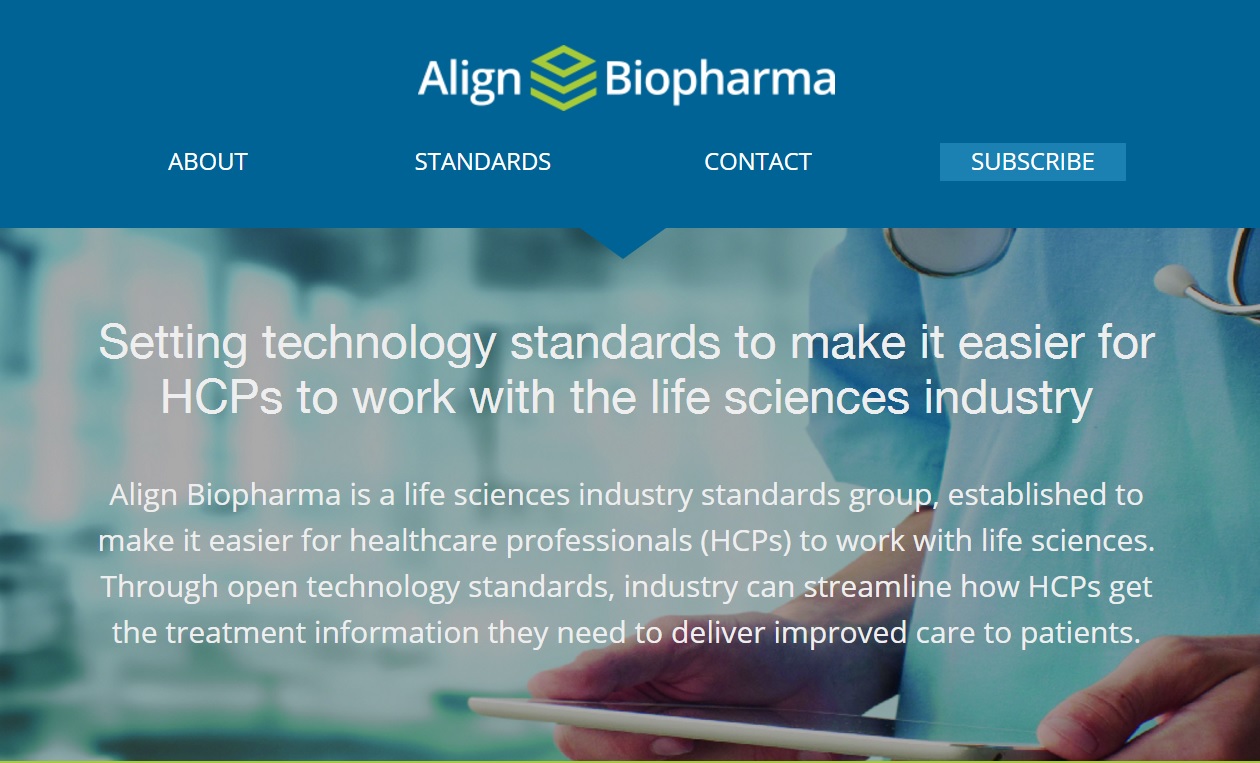When doctors need information about a medication, they often go to Google, Wikipedia, or other second-hand sources before turning to the actual life sciences company responsible for creating the product. In fact, a 2014 study from the IMS Institute for Healthcare Informatics (now QuintilesIMS) revealed that both doctors and patients use Wikipedia as their top source for healthcare information, with 50% of physicians saying they use the community-edited online encyclopedia—especially for information on specific conditions. Life sciences companies want to change that, and they are joining together to do just that.
Six of the top 25 largest global pharmaceutical companies are coming together, along with Veeva Systems to form Align Biopharma, a group dedicated to setting technology standards that will make it faster and easier for healthcare professionals (HCPs) to connect with life sciences companies. In other words, think TransCelerate BioPharma, only instead of aiming to improve R&D, Align Biopharma will try to enhance digital engagement.
“Our goal is to improve the overall customer experience for healthcare providers,” says Scott Cenci, VP of Global Therapeutic Operations IT at Biogen, one of the six founding pharmaceutical companies. The others include Allergan, AstraZeneca, GlaxoSmithKline, Novartis, and Pfizer. “We are partnering with this group to architect industry standards, which will help us to achieve that vision.”
Single Industry Sign-in
To start, Align Biopharma will focus on developing two new standards to help simplify the HCP’s experience. The first involves identity management. One of the friction points for HCPs in terms of getting information from life sciences companies is the cumbersome process of registering to receive information at each different company or product site they visit. As Veeva’s VP of Commercial Cloud Strategy Paul Shawah explains, the process is different for each company and some companies even require multiple registrations for each different product, which makes it difficult for HCPs to remember all of their different logins.
Align Biopharma wants to settle on an identification and authentication standard to enable a single sign-on for HCPs to access online content—including websites, portals, virtual events, and webinars—across all companies. It would be similar to how many consumer sites now allow you to login with your Facebook credentials, which makes it easier for individuals to get right to the content they want without having to register at each new site they visit.
Consent and Communication Preferences
The group’s second initiative is to develop a definition of standards for consent and preference management. This will help to create consistency in how HCPs specify communication preferences with each company. For instance, by what methods HCPs prefer to be contacted with information (email, RSS feeds, etc.) as well as what type of information they want to receive (disease state information, adverse event information, etc.)
While these standards will be used by each company, for each of their products, there is no carry over from site to site. So, for example, none of the actions taken by HCPs on a Novartis site will impact anything on a Biogen site that they also visit. It is simply setting a standard for how these preferences are captured on the site.
For now, the group will just focus on establishing these two standards and Shawah says that it should take the majority of this year to define and implement those within the industry. And when it does come time to decide what is next for the group, they will put it up to a vote.
Align Biopharma’s Structure
As Shawah explains, Veeva was asked to help form Align Biopharma at the request of several pharma companies. That is why Veeva has dedicated a few of its employees to help run this group, which includes Shawah, who says he will serve as the President of Align Biopharma. Additionally, there are 12 members from the six founding pharma companies who will help to determine the direction of the group.
Essentially, they all vote to determine which strategy to take and then vote again on whether the standards they’ve developed are ready to be published. Together, they all agreed that HCP identity management was one of the biggest challenges that needed to be solved, which is why that became the group’s first initiative. However, the group is not just limited to those 12 individuals.
“Member companies also nominate domain experts from the different functional areas within their companies who then allocate their time based upon the specific standard we’re working on,” adds Shawah. “But ultimately, those are the three primary roles of member companies: Establishing the direction, voting on standards, and then nominating individuals and making sure we have the right resources to develop the standards.”
Align Biopharma formed with six founding companies as Shawah says they want to keep the initial group small and focused in order to be nimble and deliver fast results. But the group is not exclusive and plans to open it up for other pharma companies to join down the line. And regardless whether a company is an Align Biopharma member or not, everyone will have access to standards published by the group, including all pharma companies, service providers, and technology vendors.
“We want to encourage other companies to use the standards that we develop, because the more a standard is used, the more valuable it becomes,” says Shawah. “Openness is a key tenet of the group as are speed and results. The digital world is changing fast and we aim to stay out in front of customers’ needs. This is not a theoretical standards group. We are doing this to solve real business problems and deliver open standards that the entire industry can use.”







